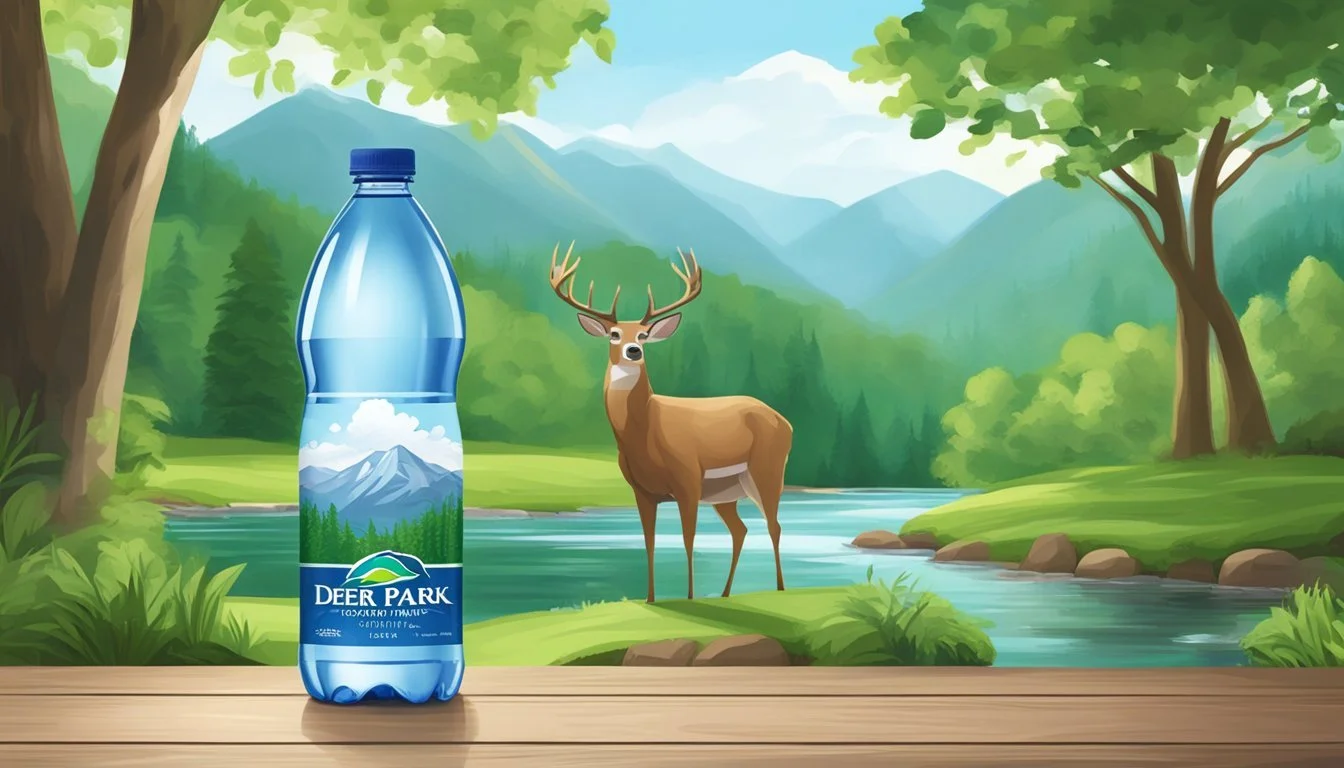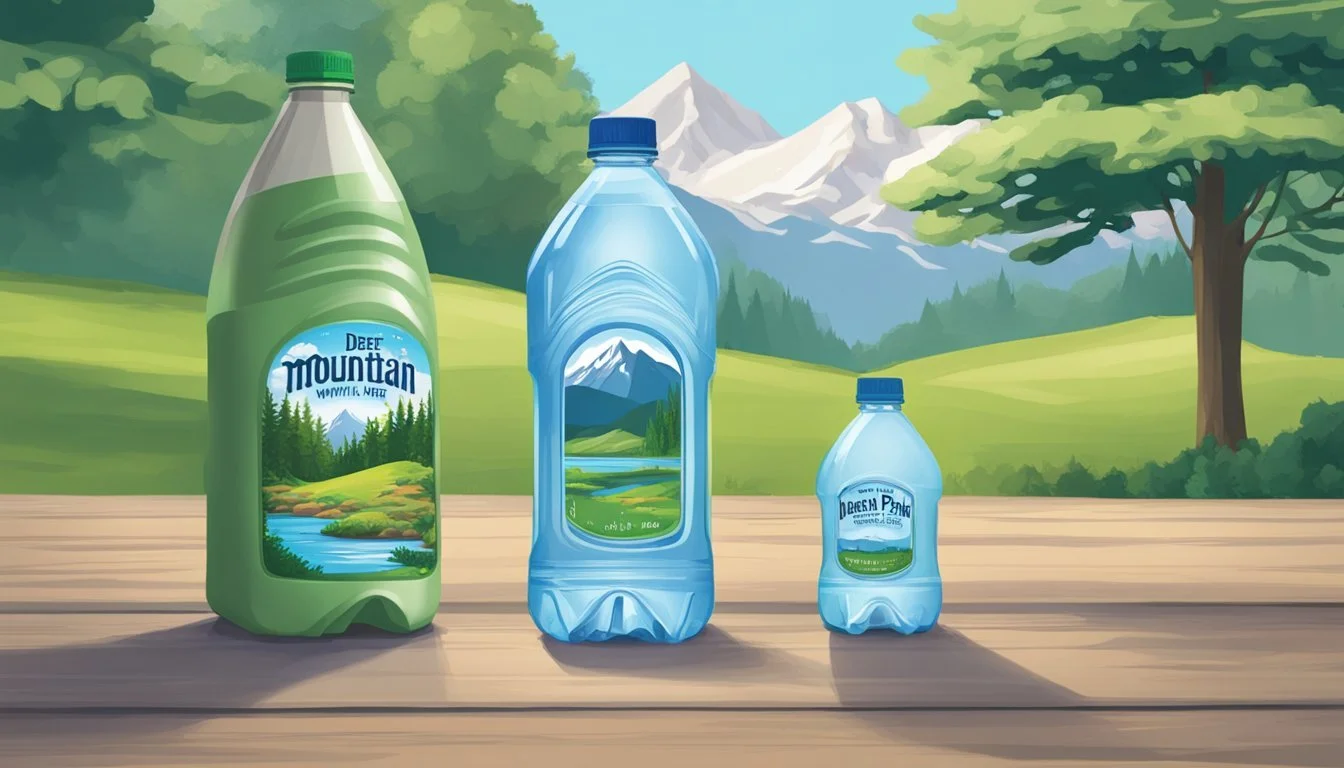Deer Park vs. Mountain Valley Spring Water
A Comprehensive Comparison
Choosing between bottled water brands can often come down to personal preference, yet some differences in quality, taste, and sourcing may influence consumers' decisions. Deer Park and Mountain Valley Spring Water are two prominent brands in the bottled water market. Deer Park, originating from the Eastern Seaboard and boasting 100% natural spring water, offers a crisp and clean taste. This brand is a part of the Nestlé family, which holds a significant presence in the global bottled water market.
Mountain Valley Spring Water, on the other hand, presents itself as a premium water brand sourced from a single spring in the Ouachita Mountains of Arkansas. The brand prides itself on providing water that is naturally alkaline and rich in minerals. The choice between these two could hinge on factors such as the presence of contaminants, environmental impact, and the presence of naturally occurring minerals that contribute to taste and potential health benefits.
In evaluating Deer Park and Mountain Valley Spring Water, customers might consider the rigorous testing both brands undergo to ensure quality and safety. Each company's commitment to environmental stewardship and the implications of packaging choices might also play a role. While Deer Park focuses on being widely accessible and having a natural taste, Mountain Valley touts its long-standing reputation for quality and a distinctive mineral composition that might appeal to those seeking a particular water profile.
Understanding Bottled Water
Making an informed choice between Deer Park and Mountain Valley Spring Water entails understanding the various types and sources of bottled water, as well as the health and safety standards that govern them.
Types and Sources of Bottled Water
Spring Water: It typically originates from underground formations from which water flows naturally to the earth’s surface. By FDA regulations, for water to be labeled as "spring water," it must be collected only at the spring or through a borehole tapping the underground formation feeding the spring.
Mineral Water: This water naturally contains at least 250 parts per million of total dissolved solids (TDS) and is sourced from a physically and geologically protected underground water source. It can be distinguished from other types of water by its constant level and relative proportions of minerals and trace elements at the point of emergence from the source.
Purified Water: It is water that has been processed to remove chemicals and contaminants. It must meet the set EPA quality standards of purity and is devoid of minerals.
Types of Bottled Water Based on Source:
Spring water: Collected at the spring or well
Mineral water: From geologically protected underground water sources
Purified water: Treated water from various sources
Health and Safety Standards
The bottling and sale of water in the United States are regulated by the FDA. In fact, bottled water is classified as a food product and must adhere to stringent quality standards. These are largely modeled on the EPA's regulations for tap water, and encompass limits on levels of contaminants and require regular testing.
Health and safety standards are mandatory and include:
FDA Regulations: Mandate specific standards for contaminant levels
EPA Standards: Apply to purified water, as it can come from any source, including municipal supply
The FDA also requires bottled water companies to identify the type and source of water on their labels. The source water plays a critical role in determining the water's taste and quality. It’s the consumer’s responsibility to be aware of and understand the labeling to ensure that they are drinking water that meets their preferred taste and safety standards.
Deer Park versus Mountain Valley
When considering Deer Park and Mountain Valley Spring Water, it's essential to examine their origins, water quality, and taste profile, including mineral content and presence of contaminants.
Brand Origins and History
Deer Park stems from the Eastern Seaboard of the United States, under the ownership of Nestlé. It boasts a history of delivering 100% natural spring water. Mountain Valley Spring Water, on the other hand, originates from the Ouachita Mountains and has been providing natural spring water since 1871, making it one of America's oldest bottled water brands.
Water Quality and Purity
Both brands claim to offer high-quality spring water. Mountain Valley Spring Water promotes its water as pure and rich in minerals and electrolytes, with a naturally high pH level indicative of its alkalinity. Deer Park, meanwhile, asserts that their water undergoes rigorous testing to ensure it meets high standards. In terms of contaminants such as lead, arsenic, heavy metals, and PFAS chemicals, both brands adhere to FDA regulations to maintain safe levels.
Taste Profile and Mineral Content
The taste of bottled water is often influenced by its mineral content. Deer Park water is described as having a crisp and clean taste reflecting its natural filtration process. Mountain Valley Spring Water is known for its distinctive taste that comes from the rich mineral content, including calcium, magnesium, and potassium, which contribute not only to the taste but also to the body’s hydration and nutritional needs.
To gauge the taste and quality, consumers often look at:
Minerals and Electrolytes: Natural presence enhances taste and nutritional value.
pH Levels: A higher pH suggests alkalinity; Mountain Valley is known for a naturally high pH.
Both minerals and pH levels combine to define the final profile that dictates consumer preference.
Health Implications
When comparing Deer Park and Mountain Valley Spring Water, it's critical to consider the health implications linked to their consumption. Aspects such as pH levels and potential contaminants directly influence health.
PH Levels and Body Health
Deer Park: This brand claims to offer 100% natural spring water. The pH level of Deer Park water typically hovers around neutral, which means it is neither too acidic nor too alkaline for the body. A balance in pH levels in the water one drinks is important, as it aligns well with the body's natural pH, facilitating proper hydration and metabolic functions.
Mountain Valley Spring Water: Known for its naturally high pH, Mountain Valley Spring Water can range above neutral on the pH scale, leaning towards alkalinity. Some studies suggest that alkaline water can help in neutralizing the acid in the body, thus potentially offering health benefits such as improved bone health. However, scientific consensus on these benefits is not firm, and more research in this area is needed.
Contaminants and Health Risks
Deer Park: The potential presence of contaminants like PFAS chemicals in bottled water can be a concern for long-term health risks. PFAS (per- and polyfluoroalkyl substances) are linked to various adverse health outcomes. While Deer Park is not explicitly reported to contain PFAS, vigilance in testing for these and other contaminants is key to ensuring the safety of any bottled water.
Mountain Valley Spring Water: Transparency about potential contaminants is paramount. Mountain Valley Spring Water is bottled at the source and the company asserts that it regularly monitors for contaminants. Consumers often look for brands that provide not only pure water but also are free from health risks such as BPA (bisphenol A) - a chemical commonly found in some plastics which can leach into water and may disrupt endocrine function. Mountain Valley Spring Water bottles are typically made of glass, which addresses BPA concerns by eliminating plastic from the equation.
Environmental Impact
When comparing Deer Park and Mountain Valley Spring Water, their environmental impacts are influenced by factors such as packaging materials and brand sustainability policies.
Plastic Bottles and BPA Considerations
Deer Park water is typically packaged in plastic bottles, which can be a concern due to the environmental impact of plastic waste. Consumers often seek BPA-free bottles, as BPA (Bisphenol A) can have health implications. Deer Park claims their bottles are 100% recyclable and most of their products are indeed BPA-free.
Mountain Valley Spring Water, on the other hand, offers its water in both plastic and glass bottles. Glass packaging, although heavier and potentially involving higher transport emissions, can be seen as a more sustainable option due to its infinite recyclability without loss of purity or quality.
Sustainability Efforts by Brands
Deer Park focuses on sustainability through initiatives such as using less plastic in their bottles and supporting recycling programs. They claim that their half-liter bottles contain up to 30% less plastic than competing brands.
Mountain Valley Spring Water asserts a commitment to sustainability with measures such as using recycled materials in their packaging and engaging in preservation efforts. For example, the brand works to protect and sustain the forest watershed surrounding their spring.
Both brands take steps to mitigate their environmental impact, but the use of different packaging materials and unique brand-specific initiatives paints a varied picture of their overall environmental footprint.
Brand Comparison and Ranking
This section evaluates Deer Park and Mountain Valley against other bottled water brands, offering a distilled perspective on how consumers rate these products from worst to best.
Comparing Deer Park and Mountain Valley to Other Brands
Deer Park Natural Spring Water and Mountain Valley Spring Water are two recognisable brands in the bottled water market, each with distinct sources and taste profiles. Deer Park sources its water from springs across the Eastern U.S. and promises a pure, crisp taste, while Mountain Valley boasts water drawn from the Ouachita Mountains in Arkansas, praised for its light, clean flavor with a hint of mineral aftertaste.
In contrast, brands like Smartwater and Fiji Natural Artesian Water offer differentiated products with Smartwater's vapor-distilled water and electrolytes for taste, and Fiji's artesian water known for its soft mouthfeel and natural minerals. Both brands assert premium positioning in the market, with Fiji often associated with its exotic source and Smartwater with its purification process.
Consumer Ratings: Worst to Best
When it comes to consumer rankings, bottled water preferences can be quite subjective, often based on factors such as taste, source purity, bottle design, and brand reputation. Here is a simplified ranking reflecting consumer preferences:
Mountain Valley Spring Water: Top marks for its velvety texture and clean taste.
Fiji Natural Artesian Water: Favored for its soft taste and high electrolyte content.
Smartwater: Popular for its purified taste and added electrolytes.
Deer Park Natural Spring Water: Appreciated by many for its accessibility and natural sourcing, but it doesn't top the list.
Other brands vary significantly in ratings, with some criticized for taste or source quality, affecting their positions from worst to best.
Mountain Valley's reputation for quality places it consistently high in rankings, while Deer Park, although not at the very top, maintains a solid standing due to its natural spring source and widespread availability.
Packaging and Accessibility
When comparing Deer Park and Mountain Valley Spring Water, one should consider the nuances of their packaging as well as their distribution networks which ensure accessibility to consumers.
Bottle Design and Materials
Deer Park utilizes plastic bottles, a popular choice for many consumers due to its lightweight nature and convenience. Deer Park bottles are made to be 100% recyclable, aligning with a growing consumer demand for sustainable packaging. Mountain Valley, on the other hand, offers its spring water in reusable glass bottles, which are favored for their eco-friendliness and ability to preserve the water's taste without the risk of leaching chemicals.
Deer Park: Plastic (100% recyclable)
Mountain Valley: Glass (Reusable)
Availability Across States and Retailers
Deer Park boasts a wide distribution network, making it readily available in many states across the Eastern Seaboard. It's commonly found in a plethora of retailers ranging from small convenience stores to large supermarkets. Mountain Valley Spring Water can claim a historic presence but has a more niche distribution. Despite this, it maintains a presence in select retailers nationwide, often marketed as a premium product.
Deer Park:
States: Broad availability, particularly in the Eastern United States.
Retailers: Diverse, from convenience stores to supermarkets.
Mountain Valley:
States: Selective availability, with a nationwide presence.
Retailers: More exclusive, often found in specialty stores and some supermarkets.
Legal and Regulatory Aspects
In the competing landscape of bottled water, both Deer Park and Mountain Valley Spring Water are subject to stringent legal and regulatory standards. These include compliance with FDA and EPA regulations, and adherence to public health guidelines, ensuring the quality and safety of their products.
FDA and EPA Regulations Compliance
Deer Park and Mountain Valley Spring Water are both governed by the Food and Drug Administration (FDA) regulations, which ensure bottled water meets federal safety requirements that are as stringent as the Environmental Protection Agency's (EPA) standards for tap water. The FDA's regulatory framework includes standards for:
Source water testing and protection: Identifying and monitoring the origins of water.
Production process monitoring: Ensuring sanitation and safety in the bottling process.
The compliance of bottled water brands with these regulations is critical to their market availability and consumer trust.
Public Health Guidelines and Quality Reports
Public health plays a pivotal role in the bottled water industry. Quality reports, often made public by companies, offer insights into the compliance with health guidelines and safety profiles of bottled water products.
Deer Park typically publishes water quality reports highlighting the presence of minerals and absence of contaminants.
Mountain Valley Spring Water has a history of low mineral contamination which aligns with public health objectives focused on reducing exposures to potential toxins.
Both brands, consistent with industry standards, provide annual quality reports as a testament to their ongoing commitment to safe and healthy bottled water.
Consumer Considerations
When choosing between Deer Park and Mountain Valley Spring Water, consumers weigh factors such as price, value, and how a product fits into their lifestyle. It is important to consider both the financial aspect and the occasions for use when making a decision.
Price and Value
Deer Park:
Price range: Generally offers competitive pricing, often seen in larger volume packaging.
Value proposition: Touted as 100% natural spring water, aiming to deliver a crisp taste.
Mountain Valley Spring Water:
Price range: Tends to be positioned at a premium price point, reflecting its branding.
Value proposition: Markets itself as a premium spring water, emphasizing its source and natural mineral content.
Consumers often look for the best combination of cost savings and perceived quality. Deer Park may appeal to budget-conscious buyers, while Mountain Valley might attract those who prioritize premium attributes associated with its brand.
Lifestyle and Usage Occasions
Deer Park:
Usage occasions: Ideal for everyday consumption, family gatherings, and large events due to its affordability and availability in bulk.
Lifestyle alignment: Suits consumers looking for a reliable, daily hydration solution without breaking the bank.
Mountain Valley Spring Water:
Usage occasions: Often preferred for special occasions, fine dining experiences, or by individuals who choose products with a strong heritage and emphasis on natural purity.
Lifestyle alignment: Appeals to consumers with a more discerning taste, or those who integrate high-end products into their daily lives for health or taste reasons.
Consumers' lifestyle choices and the specific contexts in which they use bottled water significantly influence their preference between Deer Park and Mountain Valley Spring Water.
Conclusion and Recommendations
In this section, readers will find a concise synthesis of the discussed points and a definitive stance on the two competing bottled water brands: Deer Park and Mountain Valley Spring Water.
Summarizing Key Points
Deer Park claims its water is 100% natural spring water, known for its crisp and clean taste. It is sourced from the Eastern Seaboard.
Mountain Valley Spring Water is often celebrated for its pure, natural origin in the Ouachita Mountains and its use of glass bottles for packaging.
Final Verdict on Deer Park and Mountain Valley
When choosing between Deer Park and Mountain Valley Spring Water, consumers should consider purity, taste, packaging, and environmental impact. Mountain Valley's glass bottles provide a clear environmental benefit over Deer Park's plastic packaging. Taste is subjective, but Mountain Valley has a strong reputation for its refreshing taste profile compared to Deer Park.
Purity: If a preference lies in natural sourcing without additives, both brands serve well, with Mountain Valley often noted for its long-standing history of natural purity.
Taste: Consumers favoring a classic and consistently clean taste might lean towards Deer Park, while those appreciating a fine, crisp taste may prefer Mountain Valley.
Recommendations: For those prioritizing environmental sustainability and a penchant for mineral content, Mountain Valley is recommended. For those who favor a mild, clean taste and value widespread availability, Deer Park is suitable.
The bottom line lies in aligning one's personal values, taste preferences, and environmental considerations with the brand of choice.







